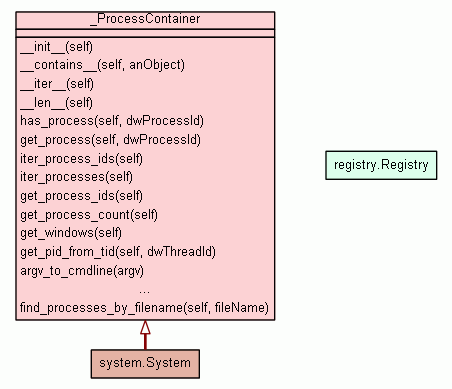
| Home | Trees | Indices | Help |
|
|---|
|
|

Encapsulates the capability to contain Process objects.
|
|||
|
|||
|
|||
| bool |
|
||
| dictionary-valueiterator |
|
||
| int |
|
||
|
|||
|
|||
|
|||
| bool |
|
||
| bool |
|
||
|
|||
|
|||
|
Inherited from |
|||
| Instrumentation | |||
|---|---|---|---|
| Process |
|
||
| int or None |
|
||
| Processes snapshot | |||
| bool |
|
||
| Process |
|
||
| dictionary-keyiterator |
|
||
| dictionary-valueiterator |
|
||
| list( int ) |
|
||
| int |
|
||
| list of Window |
|
||
| int |
|
||
| bool |
|
||
|
|||
|
|||
| bool |
|
||
|
|||
|
|||
|
|||
|
|||
|
|||
|
|||
| list of tuple( Process, str ) |
|
||
| Threads snapshots | |||
|
|||
| bool |
|
||
| Thread |
|
||
| list( int ) |
|
||
| int |
|
||
| Modules snapshots | |||
| bool |
|
||
| int |
|
||
| list( Module... ) |
|
||
| list( Module... ) |
|
||
| list( Module... ) |
|
||
|
|||
| Instrumentation | |||
|---|---|---|---|
| str |
|
||
| list( str ) |
|
||
|
|||
|
Inherited from |
|||
|
|||
x.__init__(...) initializes x; see help(type(x)) for signature
|
Private method to automatically initialize the snapshot when you try to use it without calling any of the scan_* methods first. You don't need to call this yourself. |
|
See Also: iter_processes |
See Also: get_process_count |
|
|
See Also: iter_processes |
See Also: iter_process_ids |
See Also: iter_process_ids |
|
|
Retrieves the global ID of the process that owns the thread.
|
Convert a list of arguments to a single command line string.
|
Convert a single command line string to a list of arguments.
|
Starts a new process for instrumenting (or debugging).
|
Tries to find the process ID for "explorer.exe".
|
Populates the snapshot with running processes and threads, and loaded modules. Tipically this is the first method called after instantiating a System object, as it makes a best effort approach to gathering information on running processes.
|
Populates the snapshot with running processes and threads. Tipically you don't need to call this method directly, if unsure use scan instead.
Note: This method uses the Toolhelp API. See Also: scan_modules |
Populates the snapshot with loaded modules. Tipically you don't need to call this method directly, if unsure use scan instead.
Note: This method uses the Toolhelp API. See Also: scan_processes_and_threads |
Populates the snapshot with running processes. Tipically you don't need to call this method directly, if unsure use scan instead.
Notes:
|
Populates the snapshot with running processes. Only the PID is retrieved for each process. Dead processes are removed. Threads and modules of living processes are ignored. Tipically you don't need to call this method directly, if unsure use scan instead. Note: This method uses the PSAPI. It may be faster for scanning, but some information may be missing, outdated or slower to obtain. This could be a good tradeoff under some circumstances. |
Update the filename for each process in the snapshot when possible.
Note: Tipically you don't need to call this method. It's called automatically by scan to get the full pathname for each process when possible, since some scan methods only get filenames without the path component. If unsure, use scan instead. See Also: scan, Process.get_filename |
Clears this snapshot. See Also: clear_processes |
|
|
|
|
|
|
|
|
Note: If the process is not found and the file extension is not given, this method will search again assuming a default extension (.exe). |
Private method to add a process object to the snapshot.
|
Private method to remove a process object from the snapshot.
|
Notify the creation of a new process. This is done automatically by the Debug class, you shouldn't need to call it yourself.
|
Notify the termination of a process. This is done automatically by the Debug class, you shouldn't need to call it yourself.
|
Private method to automatically initialize the snapshot when you try to use it without calling any of the scan_* methods first. You don't need to call this yourself. |
| Home | Trees | Indices | Help |
|
|---|
| Generated by Epydoc 3.0.1 on Fri Dec 20 17:54:54 2013 | http://epydoc.sourceforge.net |